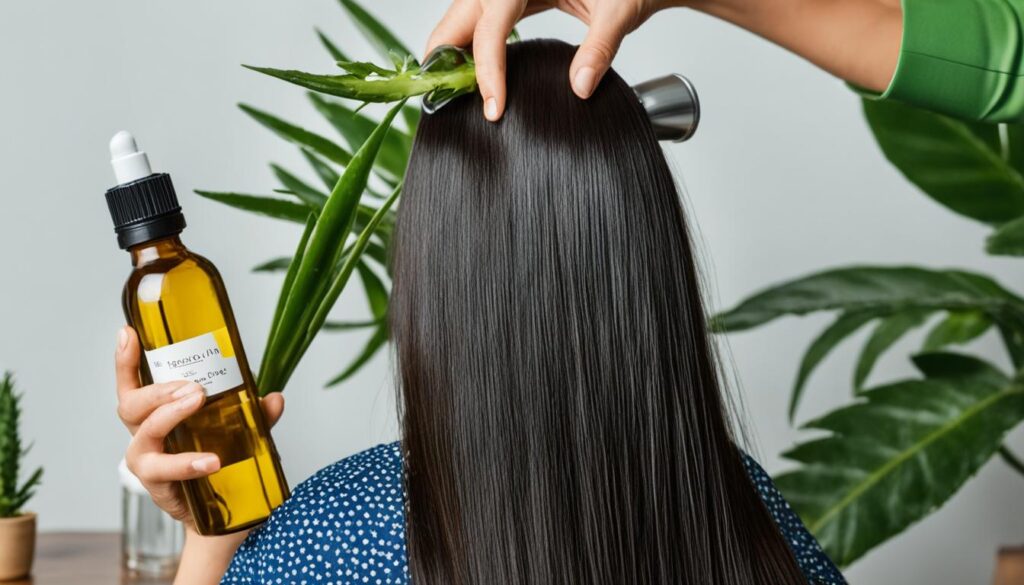Excessive use of castor oil on the hair and scalp is a concern for many individuals. There are claims that using castor oil too frequently or in large quantities can lead to hair loss. In this article, we will explore whether there is any truth to this notion and provide you with the facts about castor oil and its potential effects on hair.
Key Takeaways:
- The debate regarding castor oil and hair loss is ongoing, with some individuals believing that excessive use can result in hair loss.
- Acute hair felting, a condition characterized by twisted and entangled hair, can occur with the use of castor oil.
- While castor oil can offer benefits for hair and scalp health, such as nourishment and shine, it should be used in moderation to avoid potential side effects.
- There is currently no scientific evidence to support the claim that castor oil stimulates hair growth.
- It is essential to consult a dermatologist for personalized advice on incorporating castor oil into your hair care routine and to address any concerns about hair loss.
What is Acute Hair Felting?
Acute hair felting, also known as bird’s nest hair or plica polonica, is a rare disorder of the scalp hair. It is characterized by twisted and entangled hair, forming a hard stony mass resembling a bird’s nest. This condition can occur after the use of certain shampoos or in cases of neglected hair or underlying psychiatric illness.
The disorder is irreversible, and the matted hair needs to be cut off. The high viscosity of castor oil, combined with long hair, can contribute to sudden felting of the hair.
| Causes of Acute Hair Felting | Symptoms of Acute Hair Felting | Treatment of Acute Hair Felting |
|---|---|---|
|
|
|
The Potential Benefits of Castor Oil for Hair
While there is no scientific evidence to support the claim that castor oil promotes hair growth, it does have some potential benefits for the hair and scalp.
- Smoothing the hair cuticle: Castor oil has a thick consistency that helps to smooth and flatten the hair cuticle, reducing frizz and enhancing shine.
- Nourishing the hair and scalp: The rich nutrients in castor oil can penetrate the hair shaft and nourish both the hair strands and the scalp, helping to prevent dryness and improve overall hair health.
- Promoting scalp health: Castor oil has natural antibacterial properties that can help to combat scalp infections and maintain a healthy scalp environment.
- Preventing split ends and breakage: By moisturizing and strengthening the hair, castor oil can help to prevent split ends and breakage, promoting longer and healthier hair.
It is important to note that while castor oil can provide these benefits, excessive use can have negative effects. Using too much castor oil can make the hair greasy and heavy, so it is best to use it sparingly and according to individual hair needs.
Overall, castor oil can be a valuable addition to a hair care routine, providing nourishment, promoting scalp health, and protecting against common hair concerns. However, it is essential to use it in moderation for optimal results.
Quote:
“Castor oil has been used for centuries for its nourishing and healing properties. While its effects on hair growth are not scientifically proven, it can still offer benefits for the hair and scalp.” – Dr. Alexandra Peterson, Dermatologist
The Controversy Surrounding Castor Oil and Hair Growth
There has been a long-standing debate among experts and enthusiasts about the potential of castor oil for promoting hair growth. While some individuals firmly believe in the hair growth benefits of castor oil, citing its ability to increase blood flow to the scalp and reduce inflammation, scientific evidence on this matter remains inconclusive.
Although there is no shortage of anecdotal accounts and personal testimonials touting the effectiveness of castor oil for hair growth, it is essential to approach these claims with caution. At present, there is a lack of rigorous scientific studies supporting the direct role of castor oil in stimulating hair growth.
One study conducted in silico, using computer simulation, suggested that certain components of castor oil might exhibit effects similar to drugs used to counteract hair loss. However, it is important to note that this study was not conducted on humans or animals, and its findings are therefore speculative.
When it comes to addressing hair loss concerns, it is always advisable to consult a dermatologist or a healthcare professional specializing in hair care. They can provide expert guidance and recommend the most effective treatments based on your specific needs and condition.
While castor oil may offer other benefits for hair and scalp health, such as moisturizing properties and nourishment for dry strands, its impact on hair growth remains a topic of ongoing scientific investigation. It is crucial to approach the use of castor oil for hair growth with realistic expectations and to explore additional professional options for hair loss management.
How to Use Castor Oil on Hair
Castor oil can be a valuable addition to your hair care routine, especially if you have a dry scalp and brittle, frizzy hair. Incorporating castor oil as a pre-shampoo treatment can provide nourishment and hydration, leaving your hair looking healthy and vibrant.
Here is a step-by-step guide on how to use castor oil effectively:
- Choose the right type of castor oil: Opt for pure, cold-pressed castor oil without any additives or chemicals. This ensures that you’re getting the maximum benefits for your hair.
- Apply a small amount: Squeeze a small amount of castor oil onto your fingertips. You don’t need a lot, as castor oil is highly concentrated.
- Massage into dry hair: Gently massage the castor oil into your dry hair, starting from the roots and working your way to the ends. Pay special attention to the scalp, as castor oil can help improve scalp health.
- Leave it on for 30 minutes or longer: Once you’ve applied the castor oil, leave it on for at least 30 minutes. For deeper nourishment, you can leave it on overnight by covering your hair with a shower cap or towel.
- Wash out with clarifying shampoo: After the desired amount of time, wash out the castor oil using a clarifying shampoo. This helps remove any residue and prevents your hair from feeling greasy.
If you find the consistency of pure castor oil too thick, you can mix it with other hair oils, such as coconut oil or almond oil, to achieve a more balanced texture. This can make the application process easier and prevent your hair from feeling overly oily.
Remember, a little goes a long way with castor oil. Applying too much can weigh your hair down and make it feel greasy. Start with a small amount and adjust accordingly based on your hair’s needs.
Experimenting with castor oil as a pre-shampoo treatment can help improve the overall health and appearance of your hair. Incorporate it into your hair care routine once a week or as needed, and enjoy the benefits of nourished and beautiful hair.

The Best Hair Types for Castor Oil
When it comes to incorporating castor oil into your hair care routine, it’s important to consider your hair type and specific needs. Castor oil is best suited for hair types that are dry or frizzy, as it can provide much-needed moisture and nourishment. If you have a dry scalp or brittle, damaged hair, castor oil can work wonders in improving the overall health and appearance of your locks.
However, if you have oily hair, you may want to proceed with caution when using castor oil. The thick consistency of castor oil can make oily hair look and feel greasy, which is not desired. It’s always a good idea to test a small patch of your hair with castor oil and observe how your hair reacts before incorporating it fully into your hair care routine.
Remember, finding the right hair care products for your specific hair type is essential for achieving healthy and beautiful hair.
| Hair Type | Suitable for Castor Oil | Not Suitable for Castor Oil |
|---|---|---|
| Dry | ✔️ | |
| Frizzy | ✔️ | |
| Oily | ❌ | |
| Damaged | ✔️ | |
| Normal |
Incorporating castor oil into your hair care routine can do wonders for those with dry scalp and damaged hair. However, it’s important to remember that every individual is unique, and what works for one person may not work for another.
Always listen to your hair and adjust your hair care routine accordingly. If you’re unsure about whether castor oil is suitable for your hair type, consult with a professional hairstylist or dermatologist for personalized advice.

Potential Side Effects of Castor Oil on Hair
While castor oil is generally considered safe for use on the hair, there are potential side effects to be aware of. Excessive use or improper application of castor oil can lead to scalp irritation and other unwanted effects.
One possible side effect of castor oil is build-up on the scalp and strands. Due to its thick and sticky consistency, castor oil can accumulate on the hair and scalp, causing a greasy and heavy feeling.
The Consequences of Scalp Build-Up:
This build-up can not only make the hair look and feel unclean but also clog the pores on the scalp, leading to scalp irritation and potential hair loss. It can also attract dirt and dust, further exacerbating the issue.
Due to its heavy nature, castor oil can be difficult to remove from the hair. In some cases, individuals may find it challenging to fully wash out the oil, resulting in lingering greasy residue which can contribute to dandruff and itching.
It is important to use castor oil in moderation and according to the individual’s hair type and needs. Oily hair types may be more prone to experiencing negative side effects from castor oil, while those with dry or damaged hair may benefit from its moisturizing properties.
Patch testing on a small area of skin is also recommended before applying castor oil to the entire scalp. This test can help identify any potential allergic reactions or sensitivities to the oil.
Avoiding Side Effects:
To minimize the risk of scalp irritation and other side effects, it is advisable to follow these guidelines when using castor oil on the hair:
- Apply a small amount of oil to the scalp and hair, focusing on the ends and areas that require extra moisture.
- Massage the oil gently into the scalp to ensure even distribution.
- Leave the oil on for the recommended time (usually 30 minutes to overnight), but avoid leaving it on for extended periods.
- Thoroughly wash out the oil with a gentle clarifying shampoo to remove any residue.
- Avoid using castor oil on a daily basis, especially if you notice any adverse reactions.
- Consider diluting castor oil with a carrier oil, such as coconut oil or almond oil, to reduce its thickness and make it easier to apply and rinse out.
By following these precautions and using castor oil properly, you can minimize the risk of scalp irritation and enjoy its potential benefits for your hair and scalp.
Conclusion
While there is no scientific evidence to support the claim that excessive use of castor oil can cause hair loss, it is important to use the oil in moderation and according to your individual needs. Castor oil has moisturizing and nourishing properties that can benefit your hair and scalp, but its effects on hair growth are still debatable. Consulting a dermatologist for personalized advice on incorporating castor oil into your hair care routine and exploring the most effective treatments for hair loss is recommended.
When it comes to castor oil, it’s essential to strike a balance. Using it as part of a well-rounded hair care routine can help provide hydration and nourishment to your hair and scalp. However, excessive use may lead to build-up, clogged pores, or even scalp irritation. It’s always best to use castor oil in moderation and monitor how your hair and scalp respond to it.
In conclusion, castor oil can be a valuable addition to your hair care routine, but it should be used judiciously and in consultation with a professional. While it may not be a magical solution for hair growth, it can offer some benefits for your hair and scalp health. Remember, there’s no one-size-fits-all approach to hair care, so it’s important to find what works best for you and your unique needs.
FAQ
Can using too much castor oil cause hair loss?
Excessive use of castor oil on the hair and scalp may lead to hair loss. It is important to use castor oil in moderation and according to individual needs.
What is acute hair felting?
Acute hair felting, also known as bird’s nest hair or plica polonica, is a rare disorder of the scalp hair. It is characterized by twisted and entangled hair, forming a hard stony mass resembling a bird’s nest. This condition can occur after the use of certain shampoos or in cases of neglected hair or underlying psychiatric illness. The disorder is irreversible, and the matted hair needs to be cut off.
What are the potential benefits of castor oil for hair?
Castor oil can help smooth the hair cuticle, add shine to the hair, and nourish dry scalp and hair. It also has antibacterial properties that can promote scalp health and prevent split ends and breakage.
Is there scientific evidence to support the claim that castor oil stimulates hair growth?
There is ongoing debate about whether castor oil can actually stimulate hair growth. While some people believe that it increases blood flow to the scalp and reduces inflammation, which can be beneficial for hair growth, there is currently no scientific evidence to support these claims.
How can castor oil be used on hair?
Castor oil can be incorporated into a hair care routine as a pre-shampoo treatment. Apply a small amount to dry hair once a week, leaving it on for 30 minutes or longer before washing it out with a clarifying shampoo. It can also be mixed with other hair oils, such as coconut oil or almond oil, to balance the texture.
What hair types are best suited for castor oil?
Castor oil is best suited for hair types that are dry or frizzy. It is particularly beneficial for those with dry scalp and brittle, damaged hair.
Are there any potential side effects of using castor oil on hair?
While castor oil is generally considered safe for use on the hair, there are potential side effects to be aware of. It can cause build-up on the scalp and strands, clog pores, and lead to scalp irritation. It may also be difficult to remove from the hair and can cause dandruff and itching in some individuals.
What is the conclusion regarding castor oil and hair?
While there is no scientific evidence to support the claim that excessive use of castor oil can cause hair loss, it is important to use the oil in moderation and according to individual needs. Castor oil can provide some benefits for the hair and scalp, such as moisturizing and nourishing properties, but its effects on hair growth are still debatable.
